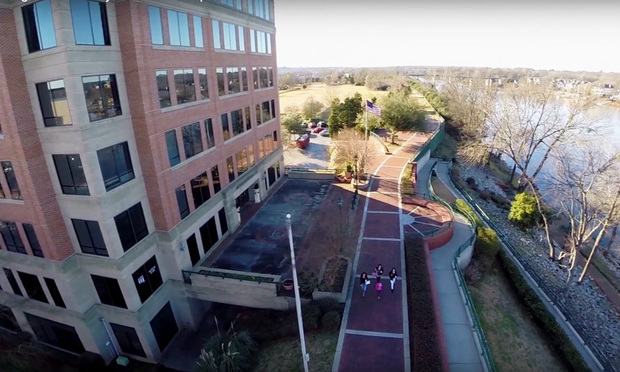Georgia Cyber Center, Touting Partnerships Across Sectors, to Open in Augusta
The new $100 million facility is slated to open its first building on July 10.
July 09, 2018 at 10:25 AM
6 minute read
 Augusta University, Riverfront Campus. Georgia's cybersecurity resources are set to get a major boost this week, as the Hull McKnight Georgia Cyber Center for Innovation and Training prepares to open its doors on July 10. The $100 million cybersecurity research and development center will sit within Augusta University's Riverfront Campus and reflects a communal partnership between Augusta University, Augusta Technical College, the University System of Georgia's research institutions, the City of Augusta, the Georgia Bureau of Investigation, and Georgia Department of Defense, among others. The new facility boasts two new buildings, including a “cyber range” for incident response training, a secure briefing area, and a startup accelerator space for cybersecurity-focused companies. The facility, spearheaded by Gov. Nathan Deal at the urging of a pair of Augusta businessmen, is intended to strengthen Georgia's global reputation as a hub of cybersecurity innovation while adding to the state and nation's cyber workforce. Augusta-based entrepreneur support nonprofit theClubhou.se, a division of Hack Augusta, will manage the Center's startup accelerator program . Grace Belangia, founding member and executive director for the theClubhou.se, noted the group will offer co-working space in both the Georgia Cyber Center and its original location in Augusta that could be available to both attorneys working with the cybersecurity community and cybersecurity startups aimed at the legal community. Michael Shaffer, executive vice president of strategic partnerships and economic development for Augusta University, noted the Georgia Cyber Center is not your average workspace, but rather a space deeply committed to its mission. “You need to tell us how you can help us meet our mission of helping our students be the next generation to meet marketplace needs. If you don't meet that mission, this is probably not your home,” he said. Georgia's law enforcement and military agencies will share resources within the space alongside academics, private and public partners. The Georgia Bureau of Investigation's (GBI) Cyber Crime Unit will for the first time open a headquarters within the Georgia Cyber Center, and will share resources with the U.S. Army Cyber Command Center in Fort Gordon. The collaborative nature of the Georgia Cyber Center is very unique within, and even outside, Georgia. Calvin Rhodes, chief information officer for the state of Georgia and executive director of the Georgia Technology Authority, pointed out that the Cyber Center will create a number of first-ever collaborations between groups, including Georgia's technical and state college systems, as well as the GBI, the Federal Bureau of Investigation (FBI), and the Department of Homeland Security (DHS). “I think the really fascinating thing that's happening here is the number of different areas that the Cyber Center will touch,” he said. “The first mission is what [Deal] says it's about, which is workforce development, and bringing multiple different entities together in a much broader way,” Rhodes added. Shaffer thinks this collaboration is likely to produce some fairly impressive innovations. “It is built around making sure at any given point in your day you're encouraged to collaborate. We can put academia in one end of the building and they can teach, and we can put GBI in and they can never interact. Here, you're forcing that interaction. That's what makes it unique,” he noted. Cybersecurity law enforcement and researchers haven't always seen eye to eye on the best strategy for good cybersecurity in the state. A cybersecurity bill passed through Georgia state legislature this year , ultimately vetoed by Deal, put cybersecurity researchers on the defensive as they battled language that could criminalize any unauthorized computer access. Rhodes and Shaffer are hoping that the Cyber Center can help bring together some of the various different parties invested in cybersecurity work to offer guidance to legislators moving forward. “I think the center will certainly be a resource for policymakers. They'll have a trusted source,” Rhodes noted. The Cyber Center will also be an active educational resource for students at its host location, something that supports the ultimate goal of training a cybersecurity workforce from the ground up. Augusta Tech president Terry Elam told the Augusta Chronicle last week that he is planning to hold nearly 45 classes for Augusta Tech upperclassmen in the facility. Georgia's existing resources, including the Cyber Command center in Fort Gordon, may uniquely position Georgia to provide this education. Shaffer finds that the military cybersecurity presence in Augusta makes for a great incentive to build and support cybersecurity training programs. “They needed a [current] workforce and future workforce, but also they have the personnel, they can help us train for being able to provide those people who will help create those courses to help train,” Shaffer noted. Last year Deal helped push $35 million in additional money for the Center , building on the $58 million originally earmarked for the project just last year. A Phase II of the Georgia Cyber Center project, including a second building for the facility, is scheduled for completion in December. Although the legal community does not have a fixed role within the Georgia Cyber Center, Rhodes imagines it has a great deal to gain from support and partnership. “There's no silver bullet here,” Rhodes added of cybersecurity more broadly. “All the groups are going to have to come together and work in concert to come up with a solution. This will be a part.”
Augusta University, Riverfront Campus. Georgia's cybersecurity resources are set to get a major boost this week, as the Hull McKnight Georgia Cyber Center for Innovation and Training prepares to open its doors on July 10. The $100 million cybersecurity research and development center will sit within Augusta University's Riverfront Campus and reflects a communal partnership between Augusta University, Augusta Technical College, the University System of Georgia's research institutions, the City of Augusta, the Georgia Bureau of Investigation, and Georgia Department of Defense, among others. The new facility boasts two new buildings, including a “cyber range” for incident response training, a secure briefing area, and a startup accelerator space for cybersecurity-focused companies. The facility, spearheaded by Gov. Nathan Deal at the urging of a pair of Augusta businessmen, is intended to strengthen Georgia's global reputation as a hub of cybersecurity innovation while adding to the state and nation's cyber workforce. Augusta-based entrepreneur support nonprofit theClubhou.se, a division of Hack Augusta, will manage the Center's startup accelerator program . Grace Belangia, founding member and executive director for the theClubhou.se, noted the group will offer co-working space in both the Georgia Cyber Center and its original location in Augusta that could be available to both attorneys working with the cybersecurity community and cybersecurity startups aimed at the legal community. Michael Shaffer, executive vice president of strategic partnerships and economic development for Augusta University, noted the Georgia Cyber Center is not your average workspace, but rather a space deeply committed to its mission. “You need to tell us how you can help us meet our mission of helping our students be the next generation to meet marketplace needs. If you don't meet that mission, this is probably not your home,” he said. Georgia's law enforcement and military agencies will share resources within the space alongside academics, private and public partners. The Georgia Bureau of Investigation's (GBI) Cyber Crime Unit will for the first time open a headquarters within the Georgia Cyber Center, and will share resources with the U.S. Army Cyber Command Center in Fort Gordon. The collaborative nature of the Georgia Cyber Center is very unique within, and even outside, Georgia. Calvin Rhodes, chief information officer for the state of Georgia and executive director of the Georgia Technology Authority, pointed out that the Cyber Center will create a number of first-ever collaborations between groups, including Georgia's technical and state college systems, as well as the GBI, the Federal Bureau of Investigation (FBI), and the Department of Homeland Security (DHS). “I think the really fascinating thing that's happening here is the number of different areas that the Cyber Center will touch,” he said. “The first mission is what [Deal] says it's about, which is workforce development, and bringing multiple different entities together in a much broader way,” Rhodes added. Shaffer thinks this collaboration is likely to produce some fairly impressive innovations. “It is built around making sure at any given point in your day you're encouraged to collaborate. We can put academia in one end of the building and they can teach, and we can put GBI in and they can never interact. Here, you're forcing that interaction. That's what makes it unique,” he noted. Cybersecurity law enforcement and researchers haven't always seen eye to eye on the best strategy for good cybersecurity in the state. A cybersecurity bill passed through Georgia state legislature this year , ultimately vetoed by Deal, put cybersecurity researchers on the defensive as they battled language that could criminalize any unauthorized computer access. Rhodes and Shaffer are hoping that the Cyber Center can help bring together some of the various different parties invested in cybersecurity work to offer guidance to legislators moving forward. “I think the center will certainly be a resource for policymakers. They'll have a trusted source,” Rhodes noted. The Cyber Center will also be an active educational resource for students at its host location, something that supports the ultimate goal of training a cybersecurity workforce from the ground up. Augusta Tech president Terry Elam told the Augusta Chronicle last week that he is planning to hold nearly 45 classes for Augusta Tech upperclassmen in the facility. Georgia's existing resources, including the Cyber Command center in Fort Gordon, may uniquely position Georgia to provide this education. Shaffer finds that the military cybersecurity presence in Augusta makes for a great incentive to build and support cybersecurity training programs. “They needed a [current] workforce and future workforce, but also they have the personnel, they can help us train for being able to provide those people who will help create those courses to help train,” Shaffer noted. Last year Deal helped push $35 million in additional money for the Center , building on the $58 million originally earmarked for the project just last year. A Phase II of the Georgia Cyber Center project, including a second building for the facility, is scheduled for completion in December. Although the legal community does not have a fixed role within the Georgia Cyber Center, Rhodes imagines it has a great deal to gain from support and partnership. “There's no silver bullet here,” Rhodes added of cybersecurity more broadly. “All the groups are going to have to come together and work in concert to come up with a solution. This will be a part.”This content has been archived. It is available through our partners, LexisNexis® and Bloomberg Law.
To view this content, please continue to their sites.
Not a Lexis Subscriber?
Subscribe Now
Not a Bloomberg Law Subscriber?
Subscribe Now
NOT FOR REPRINT
© 2025 ALM Global, LLC, All Rights Reserved. Request academic re-use from www.copyright.com. All other uses, submit a request to [email protected]. For more information visit Asset & Logo Licensing.
You Might Like
View All
40% Contingency: A New Ruling Just Cost This Plaintiff Team $827K in Legal Fees
6 minute read
'David and Goliath' Dispute Between Software Developers Ends in $24M Settlement

Trending Stories
Who Got The Work
Michael G. Bongiorno, Andrew Scott Dulberg and Elizabeth E. Driscoll from Wilmer Cutler Pickering Hale and Dorr have stepped in to represent Symbotic Inc., an A.I.-enabled technology platform that focuses on increasing supply chain efficiency, and other defendants in a pending shareholder derivative lawsuit. The case, filed Oct. 2 in Massachusetts District Court by the Brown Law Firm on behalf of Stephen Austen, accuses certain officers and directors of misleading investors in regard to Symbotic's potential for margin growth by failing to disclose that the company was not equipped to timely deploy its systems or manage expenses through project delays. The case, assigned to U.S. District Judge Nathaniel M. Gorton, is 1:24-cv-12522, Austen v. Cohen et al.
Who Got The Work
Edmund Polubinski and Marie Killmond of Davis Polk & Wardwell have entered appearances for data platform software development company MongoDB and other defendants in a pending shareholder derivative lawsuit. The action, filed Oct. 7 in New York Southern District Court by the Brown Law Firm, accuses the company's directors and/or officers of falsely expressing confidence in the company’s restructuring of its sales incentive plan and downplaying the severity of decreases in its upfront commitments. The case is 1:24-cv-07594, Roy v. Ittycheria et al.
Who Got The Work
Amy O. Bruchs and Kurt F. Ellison of Michael Best & Friedrich have entered appearances for Epic Systems Corp. in a pending employment discrimination lawsuit. The suit was filed Sept. 7 in Wisconsin Western District Court by Levine Eisberner LLC and Siri & Glimstad on behalf of a project manager who claims that he was wrongfully terminated after applying for a religious exemption to the defendant's COVID-19 vaccine mandate. The case, assigned to U.S. Magistrate Judge Anita Marie Boor, is 3:24-cv-00630, Secker, Nathan v. Epic Systems Corporation.
Who Got The Work
David X. Sullivan, Thomas J. Finn and Gregory A. Hall from McCarter & English have entered appearances for Sunrun Installation Services in a pending civil rights lawsuit. The complaint was filed Sept. 4 in Connecticut District Court by attorney Robert M. Berke on behalf of former employee George Edward Steins, who was arrested and charged with employing an unregistered home improvement salesperson. The complaint alleges that had Sunrun informed the Connecticut Department of Consumer Protection that the plaintiff's employment had ended in 2017 and that he no longer held Sunrun's home improvement contractor license, he would not have been hit with charges, which were dismissed in May 2024. The case, assigned to U.S. District Judge Jeffrey A. Meyer, is 3:24-cv-01423, Steins v. Sunrun, Inc. et al.
Who Got The Work
Greenberg Traurig shareholder Joshua L. Raskin has entered an appearance for boohoo.com UK Ltd. in a pending patent infringement lawsuit. The suit, filed Sept. 3 in Texas Eastern District Court by Rozier Hardt McDonough on behalf of Alto Dynamics, asserts five patents related to an online shopping platform. The case, assigned to U.S. District Judge Rodney Gilstrap, is 2:24-cv-00719, Alto Dynamics, LLC v. boohoo.com UK Limited.
Featured Firms
Law Offices of Gary Martin Hays & Associates, P.C.
(470) 294-1674
Law Offices of Mark E. Salomone
(857) 444-6468
Smith & Hassler
(713) 739-1250







